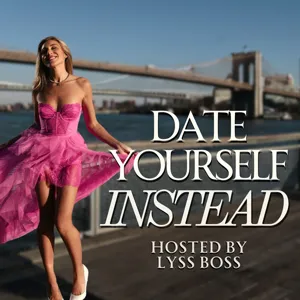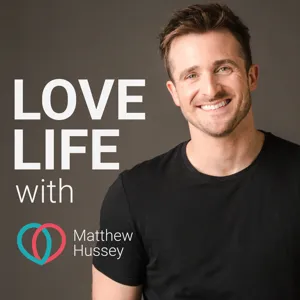Podcast Summary
Focus on what you can control in new year: Take responsibility for own feelings and actions, don't make excuses for others, examine behavior patterns, and listen to goal setting podcast for mindset foundation.
It's important to focus on what you can control in your life, particularly your mindset and reactions, as you enter a new year. Instead of making excuses for other people's behavior, take responsibility for your own feelings and actions. The podcast discusses the negative consequences of making excuses for others and encourages listeners to examine their own behavior patterns. Additionally, the speaker recommends listening to a previous podcast on goal setting and mindset to help establish a strong foundation for personal growth in the new year.
Making excuses for harmful behaviors harms relationships: Recognize harmful behaviors, communicate openly, and seek help to build healthier relationships, instead of making excuses.
Making excuses for other people's harmful behaviors can be a common coping mechanism, but it ultimately harms both parties involved. The speaker discussed various categories of behaviors that people often make excuses for, including cheating, poor treatment in public, anger issues, lack of compromise, and inconsistent communication. Excuses for these behaviors can stem from a variety of sources, such as upbringing, stress, or past relationships. However, the speaker emphasized that these excuses are often not justified and can perpetuate harmful patterns. Instead, it's essential to recognize the impact of these behaviors on ourselves and others and take steps to address them. The speaker encouraged listeners to communicate openly and honestly with their partners and seek help if needed. By taking responsibility for our own emotions and well-being, we can break the cycle of making excuses and build healthier relationships.
Making excuses for toxic behaviors: Identifying and acknowledging toxic behaviors instead of making excuses is crucial for healthy relationships.
Making excuses for toxic behaviors in relationships, whether it's from ourselves or others, is not helpful. Excuses like "they're just really guarded," "they don't know how to express themselves," or "that's just who they are" can hinder us from acknowledging and addressing harmful behaviors. It's important to identify and write down the specific behaviors we're excusing and why, as well as recognizing that excusing toxic behaviors allows them to continue. An example given was a guy making inappropriate advances towards someone at a party while having a girlfriend present. Making excuses for him, such as "he's just a flirtatious guy," ignores the fact that his behavior was intentionally disrespectful and hurtful. Instead, we should hold people accountable for their actions and communicate openly about what is and isn't acceptable in a relationship.
Excusing others' behavior isn't acceptable: People should be held accountable for their actions, and excuses don't justify poor behavior in relationships
Making excuses for other people's behavior based on the belief that "that's just how they are" is not acceptable. People are responsible for their actions, and their behavior should not be excused simply because someone else chooses to overlook it. This behavior can be a tactic used to bond with others or to be more appealing to someone, but it ultimately allows the person behaving poorly to continue their actions without consequences. Instead, it's essential to hold people accountable for their behavior and communicate openly about what is and isn't acceptable in relationships. By doing so, we can create healthier and more respectful relationships.
Recognizing the importance of individuality in relationships: It's essential to remember that we're separate individuals in relationships, capable of making our own choices and taking responsibility for ourselves.
It's common to make excuses for toxic relationships and the people in them, but doing so only keeps us trapped in unhealthy situations. We may feel a special bond or fear judgment from others, but it's essential to recognize that we're not responsible for our partners' actions or behavior. It's okay to disagree with how they act and communicate this to them directly, without feeling like we're representing them to the world. We're separate individuals, capable of making our own choices and taking responsibility for ourselves. By acknowledging this, we can create healthier relationships and avoid perpetuating toxic cycles.
Misconception of Being Easygoing as Accepting Disrespect: Don't mistake being easygoing for being a doormat. Setting clear boundaries and communicating respectfully is essential for healthy relationships.
Making excuses for other people's disrespectful behavior towards you, thinking it will make them like you more, is a mistake. This behavior can make you appear as a doormat rather than easygoing. It's essential to understand the difference between being easygoing and being a doormat. Easygoing people make choices for themselves and don't try to control others. When someone disrespects you, not raising it is letting them walk all over you. Making excuses for their behavior only encourages it to continue. Instead, setting clear boundaries and communicating respectfully is crucial for healthy relationships. Remember, being easygoing doesn't mean accepting disrespectful behavior. It means being chill with things that don't negatively impact you.
People's behaviors in relationships usually don't change unless they want to or are forced to: Don't expect someone to change their toxic behavior unless they're willing or forced to. Set boundaries, call them out, and give them space to reflect.
People's behaviors in relationships generally don't change unless they want to or are forced to. If someone is treating you poorly and getting away with it, they have no incentive to change. Trying to make things more comfortable for them or accepting their toxic behavior in hopes of changing them is a futile effort. Instead, it's essential to call them out on their behavior and not accept it. This doesn't mean being confrontational or aggressive, but rather setting boundaries and giving them space until they're ready to discuss things calmly. Remember, they expect you to adjust to them, but they don't want to meet you halfway or compromise. If someone consistently treats you unfairly, it's crucial to recognize the unhealthy dynamic and take steps to address it.
Setting boundaries and consequences: Communicate clear boundaries and consequences for unacceptable behavior to maintain healthy relationships and regain control over emotional reactions.
Setting clear boundaries and consequences for unacceptable behavior is essential in maintaining healthy relationships. This applies to various types of relationships, including personal and professional ones. When someone disrespects or yells at you, it's important to remember that you have the right to retreat and avoid engaging in the drama. People who use anger as a manipulation tactic often try to provoke a reaction from you, so maintaining control of your emotions and not engaging in their behavior is crucial. By setting boundaries and consequences, you communicate that their actions have consequences, and you take back control of the situation. Remember, anger is a loss of control, and those who manipulate others through anger prey on those who are weaker in emotional control.
Choose how we respond during conflicts: Pause, breathe, consider actions before reacting, set boundaries, and hold people accountable to prevent future incidents.
We have the power to choose how we respond to situations, especially during arguments or conflicts, particularly in text messages. It's essential to pause, breathe, and consider our actions before reacting. The quote "never reply when you're angry, never make a promise when you are happy, and never make a decision when you are sad" is a powerful reminder. Our actions teach others how to treat us. Bullies only target vulnerable individuals, and we can learn to stand strong and assert ourselves when someone wrongs us. By setting boundaries and holding people accountable for their actions, we can prevent future incidents and teach them to respect our boundaries. Ultimately, our past experiences do not define us, and we have the power to change the way we are treated by others.
No one has the right to mistreat you: People are responsible for their actions, regardless of their past, and it's essential to hold them accountable and prioritize your emotional well-being.
No one has the right to treat you poorly or abuse you, regardless of their past experiences. While it's understandable that people may have difficult backgrounds, they are still responsible for their present and future actions. It's important to hold them accountable for their behavior and encourage them to take ownership and seek help if needed. If they're unwilling to change, it's essential to recognize that their actions are their responsibility, and it's not your problem to fix. Furthermore, it's crucial not to match their negative behavior with the same energy, as it only reinforces their actions. Instead, be the bigger person and avoid engaging in negative patterns. Ultimately, it's essential to prioritize your emotional well-being and set healthy boundaries.
Maintaining peace in arguments and conflicts: Determine intentions, respect self and values, argue facts, avoid taking low blows, acknowledge unacceptable situations, and raise awareness of behavior for change.
In any argument or conflict, it's essential to determine your intentions and focus on maintaining your peace by respecting yourself and your values. Don't let your pride or the need to "win" cloud your judgment. Instead, aim to argue facts and avoid taking low blows. Remember that you can't change someone's behavior, but you can determine what you will and will not accept. Ultimately, the question to ask yourself is whether you can put up with the current situation or not. If not, it's important to acknowledge that and consider your options. Additionally, for someone to change, they must have the intention and driving force to do so. Your role is to raise their awareness of their behavior.
Respect yourself now, don't wait: Recognize that being alone is not the worst-case scenario, and being kind to yourself is essential for healthy relationships
It's important to respect and value yourself in the present moment, rather than waiting for a future self to make changes. Fear of being alone should not keep you in unhealthy relationships or situations where you are being mistreated or abused. It's crucial to recognize that being alone is not the worst-case scenario, but rather being in a toxic relationship where you are accepting mistreatment is. Changing the narrative and language you use towards yourself and your current situation can help you make necessary changes and improve your overall well-being. Remember, being kind to yourself and not accepting anything less than respect and love from others is essential.





